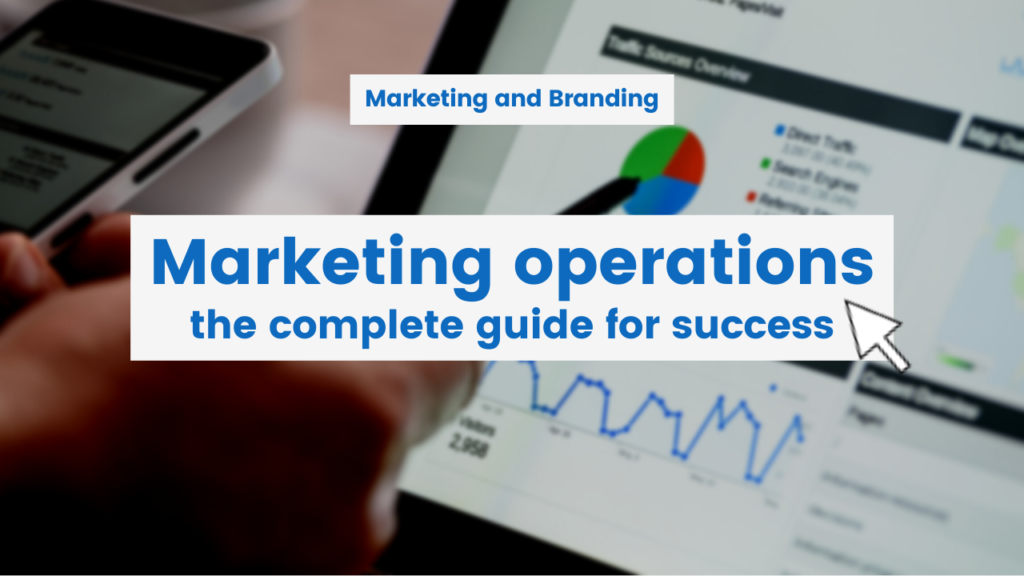A few years ago, marketing operations roles did not even exist.
So why is it becoming one of the most important areas in the digital landscape, and how can you implement it properly in your company?
Here’s the deal – companies often overlook the importance of marketing operations. And that can be detrimental to their growth and success. That’s because marketing operations are crucial to creating clear procedures for successful marketing.
Think of it this way – all marketing teams are concerned with improving results. They’re trying to grow revenue, bring in new customers, or increase brand awareness. But most marketing teams aren’t equipped with the right resources or staffing to become an effective operation.
Enters marketing operations management.
It can help your team achieve greater consistency, efficiency, and effectiveness by automating and integrating marketing processes and workflows. Important components include marketing or advertising strategy development and planning, asset creation, campaign execution, and campaign analysis and reporting.
This blog will walk you through establishing an efficient marketing operations team, the importance of marketing operations, what marketing operations are, and much more.
So, let’s get into it!
Cut design & video review time in half
Try GoVisually free today!
Table of Contents
What is marketing operations?
Marketing operations is a term that has been around for over a decade and is still widely misunderstood. There is no set marketing operations definition, but we can still help you understand what it consists of.
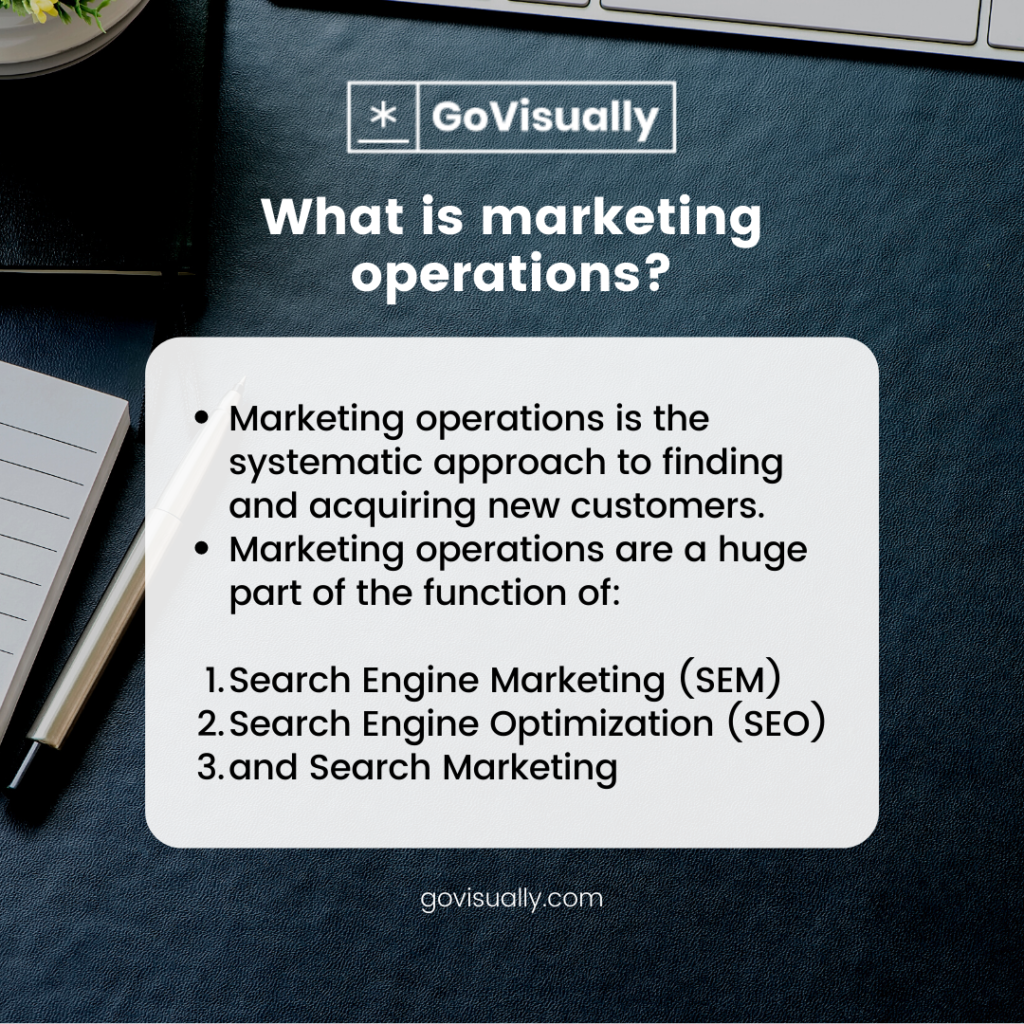
What exactly is marketing operations?
Marketing operations is the systematic approach to finding and acquiring new customers. It’s a never-ending process and is constantly being tweaked and improved.
Mind you; it’s not just the job of your marketing team but the collective effort of your entire organization. Marketing operations are a huge part of the function of:
- Search Engine Marketing (SEM)
- Search Engine Optimization (SEO)
- and Search Marketing
In the traditional marketing model, identifying and qualifying leads and moving them through the sales funnel is done by a sales team. However, marketing operations enable departments to function effectively and deliver the desired business result through processes, people, data, and technology.
Is marketing operations a technical department?
While traditional marketing skills, such as strategic and creative thinking, are still required for top marketing team members, additional technical and analytical skills are also needed in marketing leaders to keep up with ever-increasing technology and data managed by marketing departments.
Marketing operations create and manage all the moving parts of digital marketing. More specifically, marketing operations cover the tools and technology that you can use to automate your marketing efforts and increase the effectiveness of your campaigns.
Sound technical?
It can be, but the best way to understand marketing operations is to think of the people who work in this field. These people are often referred to as marketing operations professionals, and they’re responsible for streamlining marketing efforts and improving customer experience through technology.
Why is marketing operations important?
Marketing operations (MO) refers to a team of professionals who coordinate the execution of all marketing work. MO is a relatively new term that large corporations use, but it can also be applied to small businesses. Marketing operations are commonly called marketing or business support in a small business.
The MO department is responsible for deploying various marketing initiatives and communications. The most effective marketing campaigns are the ones that are built around a solid strategy.
Marketing operations are responsible for developing and deploying your plan, and the MO department is tasked with three core areas.
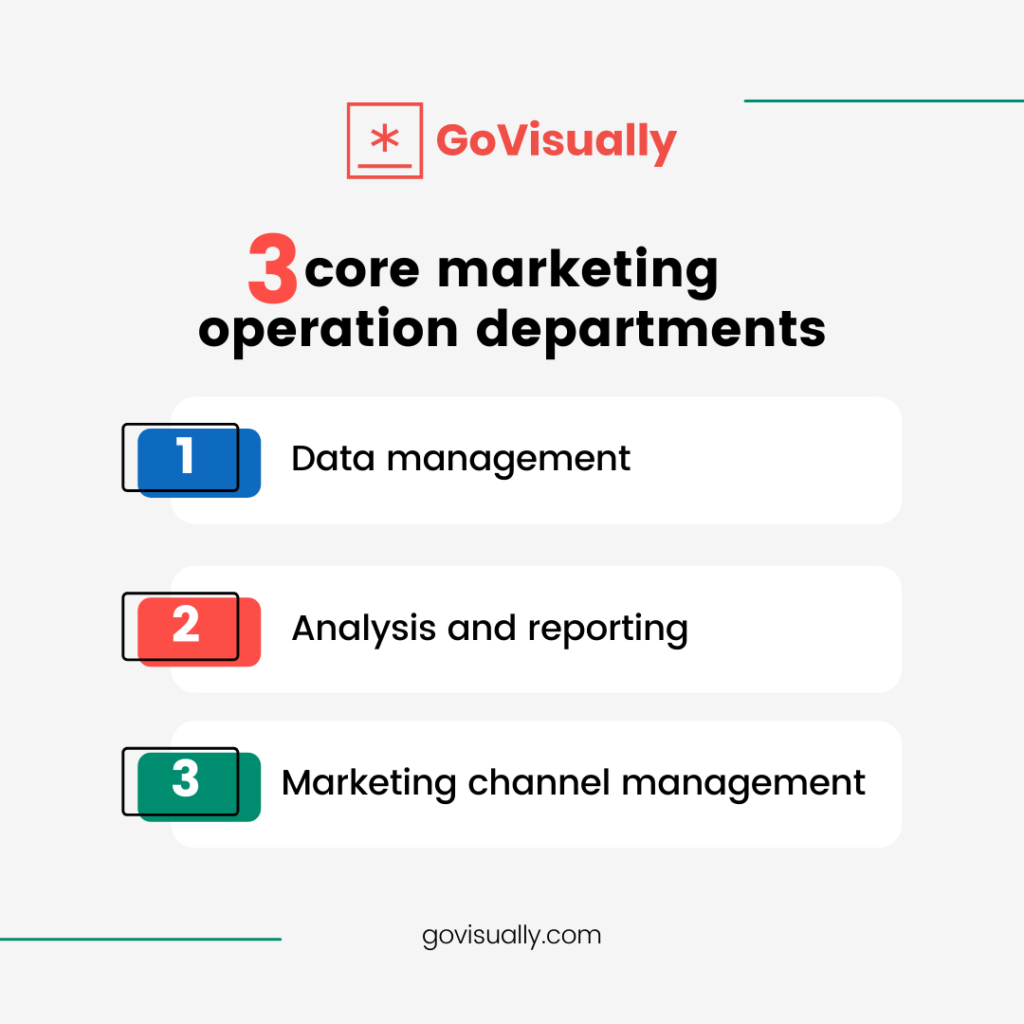
Marketing operations is a crucial part of any business — and it’s not just an extension of marketing. It’s a true business partner responsible for the efficiency of your company’s marketing efforts. It’s how you optimize your campaigns, build and manage your brand, and ensure that your marketing metrics are accurate and precise.
And while the marketing operations team typically has a marketing background, they’re also responsible for business processes, data analysis, and technology. In short, they work hard to ensure that all of your marketing efforts are working as they should.
Is marketing operations vital for running a business?
Without marketing operations, it’s hard to measure the performance of marketing efforts and track and monitor the marketing process.
Marketing operations must be in place to ensure that marketing technology is being used to its full potential. That’s because it links marketing and the rest of the business.
Marketing operations is about orchestrating the best possible customer experience for your brand. It is about getting your customers to the right page at the right time, on the right device, with the right offer and the right message.
Marketing operations management can be successful because you can achieve greater consistency, efficiency, and effectiveness by automating and integrating marketing processes and workflows. Important parts include developing and planning a marketing strategy, creating assets, running campaigns, and analyzing and reporting on a campaign.
Why is there a growing focus on marketing operations?
As the digital marketing environment evolves, implementing effective marketing practices is more important than ever. Modern multi-channel coordination, integrated campaigns, and reliance on external partners make modern marketing processes complex and cumbersome to manage.
Teams are always reluctant to update their day-to-day management tools and processes because change isn’t always easy, even if it has to be constant! Every marketing group faces this challenge, and you can address it by making significant execution changes.
There are a few clear reasons why the focus on marketing operations has grown over the past few years:
- Marketers are responsible for travel metrics, such as earned opportunities or earned revenue, that are harder to track than visits, impressions, or leads.
- The marketing environment has exploded, and marketers need to put in a lot of effort to handle more complex technology packages.
- Good marketing operations can give companies a competitive advantage if they make decisions based on accurate and clean historical data.
With the right approach to marketing operations management, you can plan and create marketing programs and workflows based on business initiatives and deliver them with confidence at a tactical level with consistent reporting, assurance, and implementation methods.
Adding a budget view to this governance model allows you to achieve financial control while enabling joint program planning, allocation, and implementation.
5 core elements of marketing operations
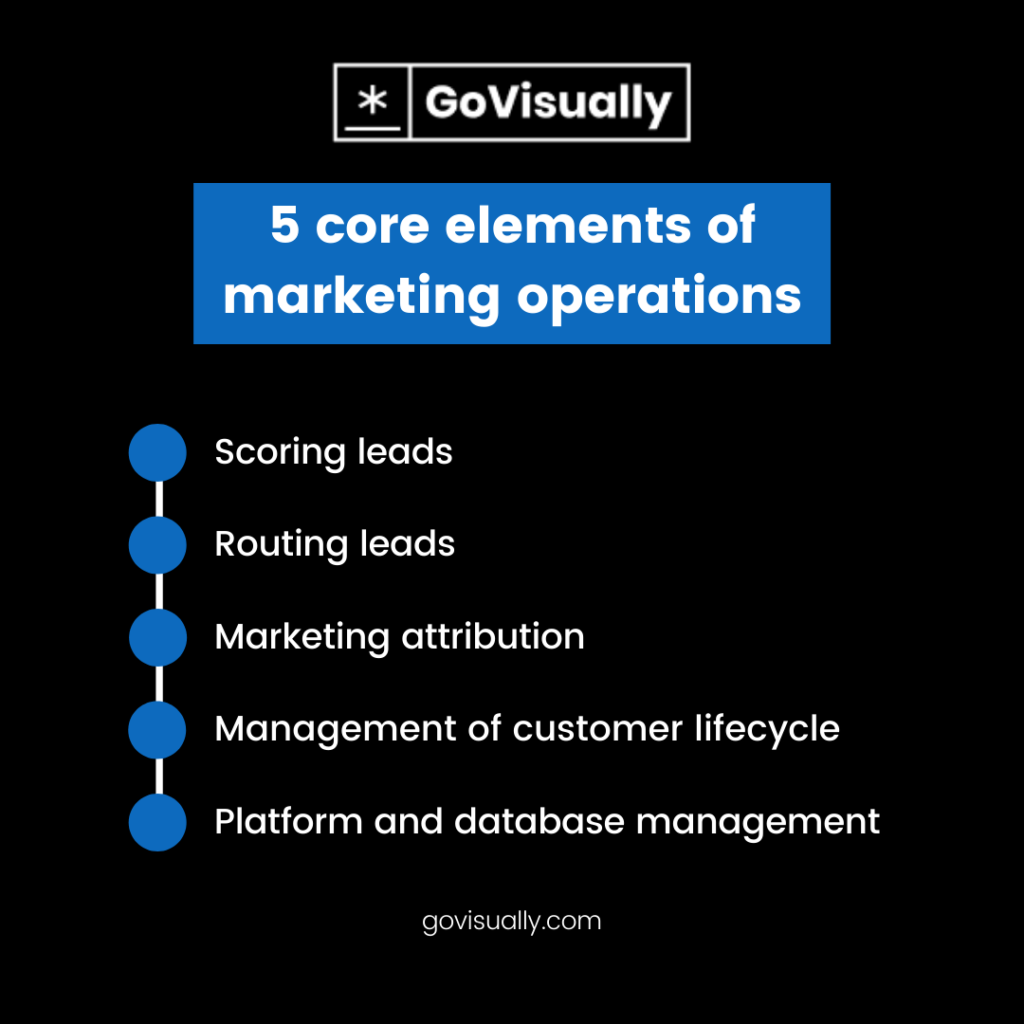
Scoring leads
There are two basic types of scoring leads today: traditional lead scoring and predictive lead scoring. The traditional way of scoring leads is likely to be developed by the marketing operations team, while predictive models use software platforms managed by the operations team.
Scoring leads can help you measure the quality of potential customers in your database and their willingness to communicate with the seller. Traditional lead scoring models are divided into two main sections, detailed data (information collected in forms) and ambiguous data (digital body language followed by your marketing automation platform).
Your marketing automation team should be expected to analyze this data and build a model based on its findings.
Marketing attribution
Marketing attribution is a very important part of marketing operations. It’s not to be confused with the more common use of attribution, which is to measure the impact of marketing campaigns on the sales of a product. Marketing attribution aims to put measures in place to determine which marketing activities are causing sales and revenue increases.
The reason why marketing attribution is so important is that marketing is expensive.

In a nutshell, marketing attribution is assigning credit to specific marketing activities for incremental sales. For instance, if you advertise on Facebook and your ad leads to a sale, how do you know how much of that sale resulted from your Facebook ad, and how much was because of your other marketing activities?
Attribution is assigning credit to specific marketing activities for incremental sales.
Routing leads
Marketing operations (MO) is a core area of marketing that includes the procedures and activities used to support the delivery of a marketing campaign. Marketing operations need to be in place before the launch of a campaign as it can help ensure that the campaign is a success.
This can be done by routing leads through an effective marketing operations process, including lead management, nurturing, and lead generation. Marketing operations consider how a company can build a strong lead generation strategy to help it reach its business goals and generate revenue.
When a lead submits a form to your website, leads and qualifications drop dramatically within minutes and continue within the next few hours. It is important that the sales operations team can quickly direct this management to a pair of sales representatives.
This is best done through a marketing-skilled workflow and lead allocation rules in your CRM that direct the lead to the appropriate vendor based on territory or specialization, such as company size.
Management of customer lifecycle
The lifecycle of a typical customer starts with lead generation, followed by the nurturing and management of the lead until it eventually becomes a customer. This process is not as straightforward as it sounds.
When a lead is generated, it has to be nurtured to be converted into a customer. Nurturing a lead and converting it into a customer is the customer lifecycle.
Marketing is fast becoming responsible for the customer’s entire life cycle. A recent report by Gleanster and Act-On found that interaction within the customer lifecycle can be called participation in the sales lifecycle because marketing has the same goal: being involved in all phases of the customer journey.
This means that it is essential for sales and marketing teams to know where a potential customer or account is in the purchasing process. Monitoring the customer lifecycle is a crucial pillar of marketing operations -This requires closed-loop reporting on your marketing and CRM automation platform.
Platform and database management
Marketing operations are what you do to ensure your marketing activities are successful. One critical aspect of your process is the database and platform to support it. These are the critical components that ensure you can deliver the right message to the right person at the right time.
As you grow and your marketing operation becomes more complex, you need to ensure that your data is centralized and accessible. Without database and platform management, you will risk making your marketing operation more convoluted and less effective.
Marketing Operations is expected to manage multiple marketing automation platforms, such as websites, eCommerce solutions, evaluation and approval software, and a content management system, including integration with related technologies.
To ensure business alignment, they also manage AdWords technology, product analysis, A / B testing, social media, and ABM marketing.
5 tips to improve marketing operations
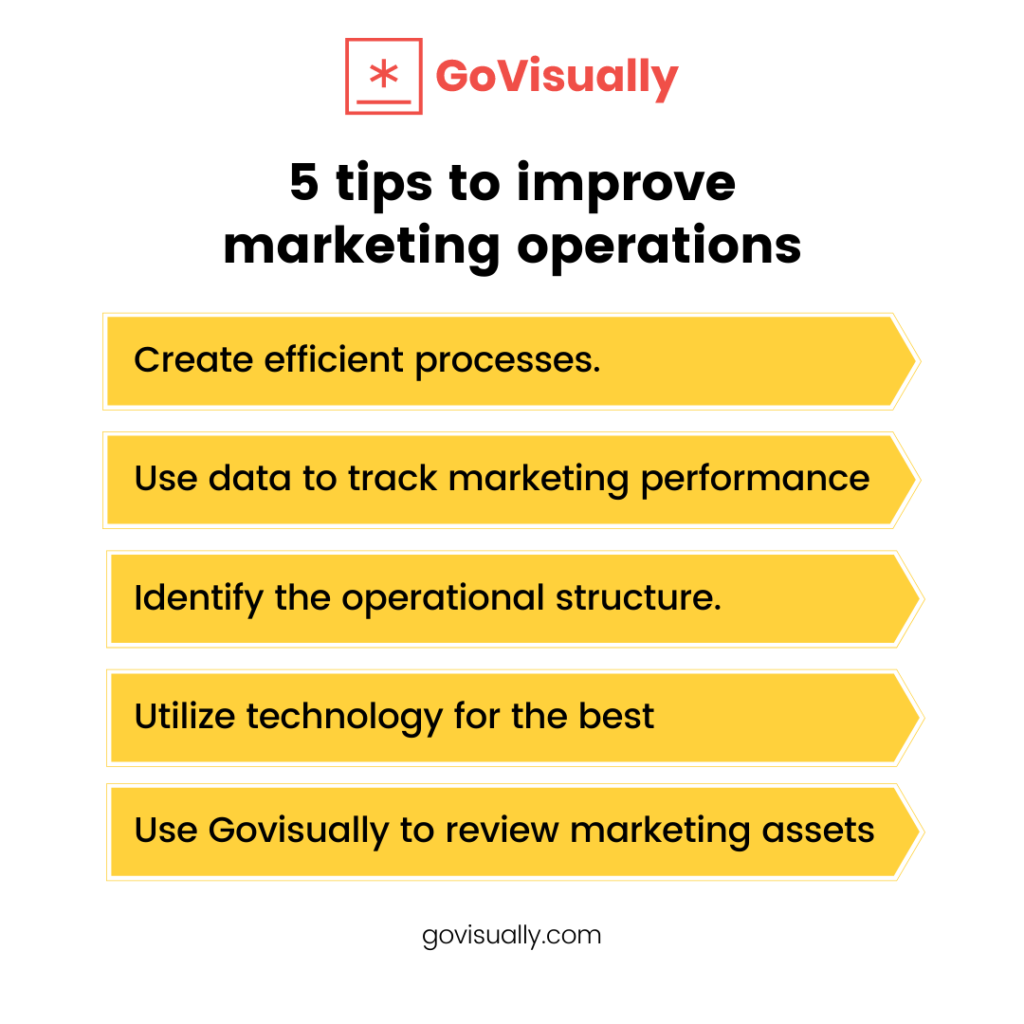
1. Identify the operational structure
Defining individual roles within helps prevent unnecessary overlap and waste of resources. Once people have a clear set of responsibilities and see how they fit into a team to help achieve goals, you can have a strong and focused team.
For marketing operations involving more than one team, decide whether the units will operate within a centralized decision-making structure or whether local teams have more tactical decision-making autonomy.
2. Use data to track marketing performance
Data-driven marketing allows you to continuously measure performance and adjust your strategy to always be on the road to achieving goals. It also eliminates the impact of HIPPO and shortens the time for debating opinions.
Streamline data-driven marketing by automating report generation. Implementing a data-based marketing approach is important because it allows you to define goals and track performance in terms of value. Work with stakeholders to identify performance indicators and ensure that they are closely aligned with sales and business objectives.
3. Create efficient processes
Defining business and marketing goals comes first. Your most powerful management tool is clear and specific goals. Explain your battlefield and understand where your efforts are likely to have the greatest impact on your goals.
It seems important if you already have this kit, but it’s also important to make sure people are responsible. Monthly status and date meetings are the best way to accomplish this. If everyone on the team is on the same page about all the operations, you will be on your way to success.
For a marketing plan to run as smoothly as possible, every aspect of the marketing plan must be guided by a process that considers the decision-making structure, available resources, technology, and internal and external policies.
Designing efficient processes can require trial and error, so be prepared to adjust them if necessary. Once you get it, you will realize how it smoothes out your entire workflow, and the team starts working better and more efficiently.
4. Utilize technology for the best
While we don’t recommend pursuing every other glorious innovation, technology can be a great weapon in your arsenal when you need it. Tools like Adobe Creative Cloud, Salesforce Pardot, Google Drive, and Wave Analytics accelerate and facilitate traditional staffing and time-consuming tasks.
An annual review of key software in your company can help, as old operations and management tools can be harmful to you and your team. It is always good for you and your team to stay updated on software. Using these tools can help you enhance your performance and make all the various processes more efficient.
5. Use GoVisually to review marketing assets
When you’re running multiple marketing campaigns, chaos is bound to occur.
So the question isn’t how to get rid of the chaos. The question that you should be asking yourself is how do you best manage the chaos?
And the answer lies in making your workflow as efficient as possible.
One of the ways you can full-proof your work process is by ensuring an efficient review process – which is a major part of most marketing campaigns. You don’t want to create a great campaign and then get stuck in getting its approval for weeks, right?
We get you!
And that is why you need GoVisually for marketing campaigns. Simply upload assets for review there and get real-time feedback from all stakeholders.
It’s that easy! Try today.
4 benefits of marketing operations
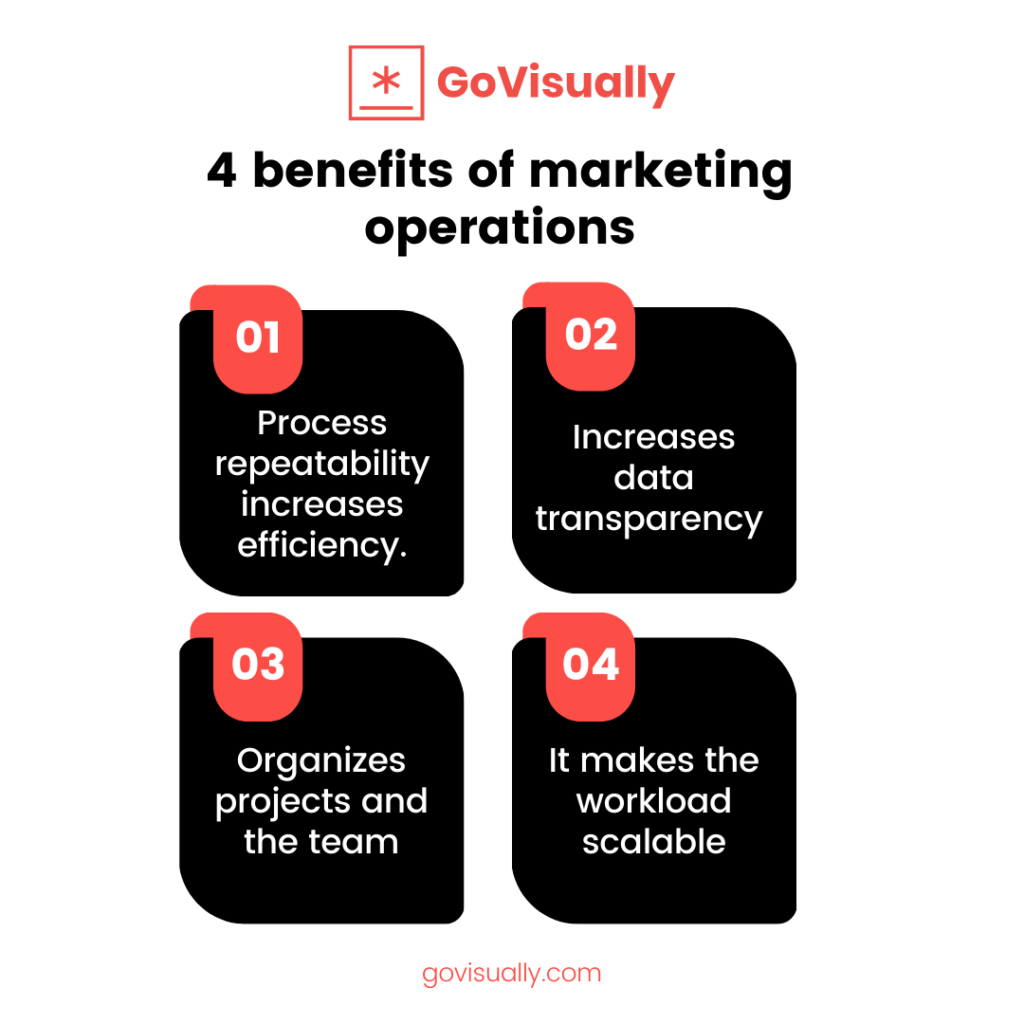
Increases data transparency
With the help of marketing operations, you can ensure that all data related to your business is out for all team members to see, and nothing is kept hidden. When there is complete data transparency, all stakeholders can be aware of progress.
Data transparency also enables everyone on the team to make more informed decisions and work towards the growth and success of the business. Once the data has been collected and analyzed by the marketing team, it can be incredibly beneficial for everyone.
Organizes projects and the team
Marketing operations is the force that binds all the various marketing teams and stakeholders together. Without successful marketing operations running in a company, there is a lack of cohesion and team effort in the workforce.
When marketing operations bind all the departments and teams together, they ensure that everyone is aware of everything going on in the organization. They help get all employees and stakeholders on the same page and ensure all the strategies and plans are executed well.
Process repeatability increases efficiency
One significant aspect of having marketing operations as a part of your marketing department is to improve processes. Marketing operations ensure all processes are better planned and executed and help improve the efficiency of all workers.
The processes developed and improved by the marketing operations are repeatable. That is why a good operation will be the one that saves time and makes the workflow more efficient.
It makes the workload scalable
Marketing operations is an excellent way for everyone on the team to plan for the future and figure out what steps they need to take. It creates repeatable processes to increase efficiency, but it also enables the team to develop strategies that will benefit them in years to come.
With the data transparency brought by marketing operations, everyone can work on scalable strategies and plans and track the progress made during the duration of the work. When the right data is available for the stakeholders, they can make more beneficial decisions for the company and business.
What does a marketing operations manager do?
Marketing operations managers must overlook various things. They need to keep track of the programs, data, and technology used. Although the work is extensive, the marketing operations manager role is often highly-paid.
The marketing operations manager’s role also depends on the industry and size of the organization. They usually have to track the progress, record data, use the data to develop strategies, produce reports, and conduct analysis of the data they have recorded.
Marketing operations managers often rise through the ranks and secure higher positions like a marketing operations analyst or a marketing manager that encompasses the duties of a marketing operations analyst and manager.
7 qualifications to look for in a marketing operations manager or marketing operations analyst
When hiring a marketing operations manager or analyst, there are various skillsets you should look for and some key qualifications you need to consider.
Let’s find out what these are.
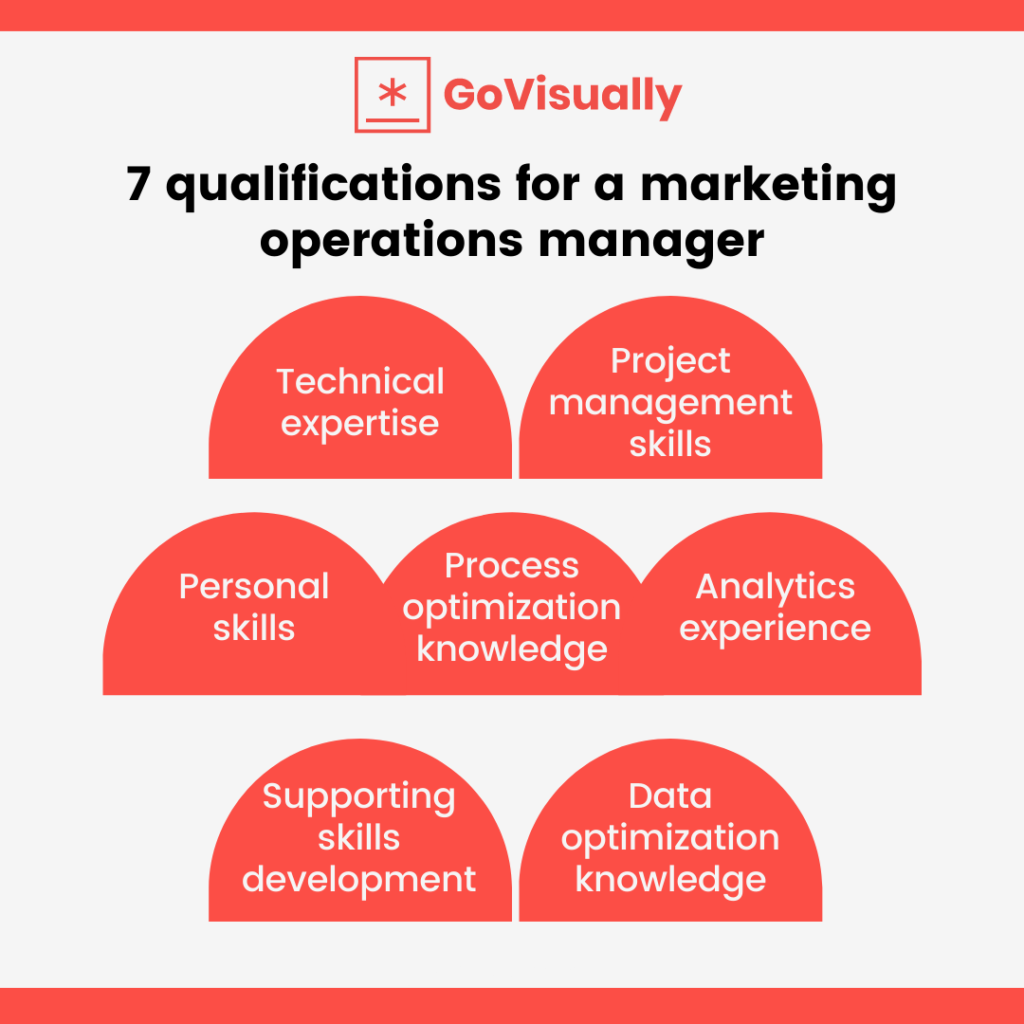
Technical expertise
The marketing operations manager or analyst has to work closely and manage technology. They need to:
- Audit and optimize existing systems
- Manage technology vendors
- Manage, implement, and evaluate the various marketing technology systems and integrations
- Develop the strategy and roadmap for the release of new products and solutions
Personal skills
As a manager, you need personal skills. When hiring a marketing operations manager, you should look for someone who is:
- Methodical, systematic, and accurate
- Has strong interpersonal skills and becomes an excellent team player when needed
- Able to prioritize and organize various tasks
Analytics experience
The marketing manager needs to be able to analyze data and produce accurate reports. You need to hire someone who can:
- Measure efficiency of the entire team by project, role, or step
- Track analytics, reports, and team dashboards to measure how effective the marketing channels are
- Give stakeholders insights regarding the business and growth
Data optimization knowledge
A marketing operations manager or marketing operations analyst needs to be able to:
- Ensure the business is following the best practices when it comes to data and marketing privacy
- Make sure that your team collects the marketing properly
- Research and find new ways to enrich the data
Project management skills
The marketing operations manager has to be involved in the planning, executing, and monitoring of various projects. They should be able to:
- Manage ROI reporting on various activities
- Spend vs. budget reports for different projects
- Manage creative digital projects
- Compliance and risk management
- Manage the change in programs with all key stakeholders
Supporting skills development
The marketing department must always be growing and improving. Your marketing operations manager needs to:
- Inform the team about the best marketing and technology practices and processes
- Help the organization adopt new solutions and keep evolving
- Provide mentoring for individuals on the marketing team
Process optimization knowledge
Optimizing various marketing processes is a key skill your marketing operations manager needs. They should:
- Create and design new operating processes
- Provide advice to campaign managers regarding personas and segmentation
- Layout the marketing objectives for each campaign
- Update existing processes to become more modern
- Make sure each campaign is up to the current standards and is of high quality
5 best tools for marketing operations
1. GoVisually
GoVisually is one of the best online-proofing tools that enable you to streamline your review, approval, and creative workflow. With the help of GoVisually, you can make the approval process for all your assets incredibly straightforward and efficient. Reviewers can see and comment on the designs, and editors can make the changes as quickly as possible.

You can centralize the reviewing process through GoVisually and include all stakeholders on the same platform. This impeccable tool enables you to avoid backlog and helps you meet the deadlines for all projects.
You can also view all versions of a file in GoVisually and compare them to review and edit the file effectively. GoVisually ensures that every project you work on is excellent and high-quality.
2. Asana
Asana is one of the top management tools marketing operations use to ensure all team members are on the same page and working efficiently. It enables everyone to focus on the daily activities and tasks and helps team members meet all their deadlines.
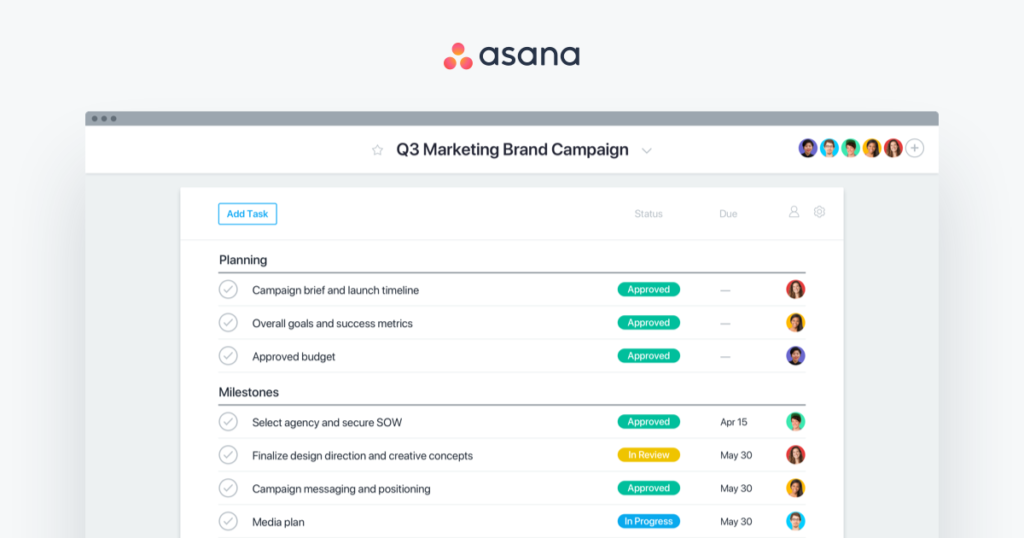
Asana can help marketing operations by streamlining the workflow and setting deadlines. It brings structure to the team, and you can store all the conversations, notes, and files in one place to get easy access.
With Asana, you can also track the progress of each project and see how your team members are working towards meeting the deadlines.
3. Prophix
Marketing operations can run smoothly if the budgeting process is efficient and accurate. Prophix is a tool that helps you create budgets in less time than it would take if you used spreadsheets.

Accuracy in budgeting is crucial, and with Prophix, you don’t have to worry about any inaccuracies. It collects data from various platforms and condenses it to ensure that your results are correct. When marketing operations rely on manual data input, there is a higher risk of human error. You can eliminate this risk by using Prophix.
It also helps with collaboration as members from different departments can enter their requirements and forecasts in one place when developing annual budgets. It also avoids the risk of errors if you are switching between other sheets for the budget.
4. Process Street
Marketing operations need to develop collaboration processes that are efficient and repeatable, and Process Street is the perfect tool for that. It is a free and simple tool that you can use to manage all your routine procedures and checklists.

Process Street has a simple drag-and-drop interface that enables you to create procedure documents more efficiently. You can also keep track of project progress by getting notifications regarding checklists.
Process Street also allows integrations with over a thousand applications. You can use these integrations to set up a smooth workflow and improve the productivity of the entire marketing team.
5. Google Data Studio
Reporting is a crucial aspect of marketing operations. You need to constantly record metrics and data and use them to measure the success of current campaigns and plan future campaigns. Google Data Studio is one of the most useful tools for that.

Google Data Studio provides you with visual reports and interactive dashboards that help you make better decisions regarding the business. You can use this tool to pull data from various third-party tools like Google Ads, Analytics, Spreadsheets, etc.
Google Data Studio allows you to use the raw data and create reports that are easy to understand for all stakeholders. You can use these reports to compare results and decide which strategies work for the business.
Key takeaway
Marketing operations is a fast-growing field. However, it is the only discipline that spans the entire marketing process, from lead generation to revenue generation. So we hope that our guide helps you understand and implement it better!
Do share your thoughts with us in the comments.
Want to send big files?

Need a quick way to share large files and creative assets?
With GoVisually Share, it’s absolutely free! Try today.
